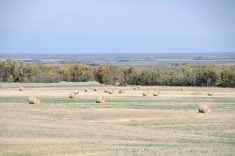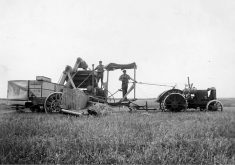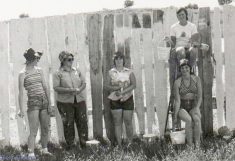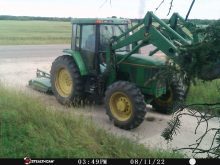Parents in Rosenort are getting a local day care after years of fundraising and advocacy.
“There is a huge need,” said Jenn Rzesnoski.
When her oldest son went into daycare, Rzesnoski had to drive him to St. Jean Baptiste, 20 minutes away from her home, and then drive another 20 minutes to Rosenort.
Read Also

Tie vote derails canola tariff compensation resolution at MCGA
Manitoba Canola Growers Association members were split on whether to push Ottawa for compensation for losses due to Chinese tariffs.
Other community parents were in the same boat. About five years ago, they formed a board and began to fundraise to build their own daycare.
The parents held community dinners and hotdog lunches, ran a canteen at the local summer festival and hosted craft sales, raising about $50,000 to renovate a building donated by a local business.
This month, the provincial and federal governments gave the community a major leg up: a daycare in a box.
[RELATED] Young farmers call for better rural childcare
On Nov. 14, the province and feds announced up to $70 million in capital funding to create more than 1,200 regulated non-profit child-care spaces. The funds focus on rural and First Nations communities, a joint news release said.
The first 650 spaces, which include Rosenort, will be built through a partnership with JohnQ Public, a working group of municipalities and First Nations.
Daycare in a box
Members of JohnQ Public wanted to know how to build a daycare quickly, said Colleen Sklar, a member of JohnQ Public and executive director of the Winnipeg Metropolitan Region.
Through JohnQ Public’s building arm, JQ Built, the group developed a model it calls “daycare in a box.” It comprises templates and tools to help present a proposal to local councils, apply for funding, issue a request for proposals, and other technical details, Sklar told the Co-operator.
“It makes it easy for communities to do.”
[RELATED] Childcare deal holds promise for farm families: KAP
The group also developed a building model. Regulations on how a daycare must be built are rigorous and complex, said Sklar. This takes it off community groups’ plate.
Each building is partially prefabricated, hauled to the community and assembled into a daycare suitable for 74 children. The design is portable enough to be shipped to remote northern communities.
Because the buildings are standardized, JohnQ Public can bulk-buy components to save money, Sklar said.
Nine communities will be the first to try the model, all of them closer to Winnipeg, Sklar said. This allows JohnQ Public to work out the kinks in the system.
“Through the John Q daycare pilot project, local leaders, administration, provincial experts and child-care providers have taken a team approach to developing a new process that supports the delivery of critical infrastructure faster and more efficiently,” said Brad Erb, chair of JQ Built and Reeve of the RM of Macdonald, in the Nov. 14 news release.
“We are excited to share this process so more communities large, small, rural, urban and northern across Manitoba can participate.”
The nine funded communities will put out requests for proposals to run the daycare. Rzesnoski said the board of parents will apply.
“We’ve put a lot of time and energy into getting a daycare in Rosenort, so we’d really like to be involved with the one we are getting,” she said.
The money parents have already raised will go toward an outdoor play space for the centre, she added.
[RELATED] Rural childcare may need public management to succeed
Great rural need
Rosenort is a microcosm of issues rural parents face.
In 2017, Canada had daycare space for about 25 per cent of children under 12, wrote sociologist Susan Prentice in a paper titled The Challenge of Rural Childcare in Canada. Rural, northern and Indigenous communities are particularly underserved.
Finding a childcare spot can be “exhausting,” said Brad McEachern, a Niverville resident who works in Rosenort.
By “luck, pure luck,” he was able to place his children in a family friend’s home daycare. Coworkers haven’t been so lucky, McEachern said. Some drive their children to St. Agathe, 26 kilometres from Rosenort, for daycare. Another drives from Winnipeg to Ile de Chenes, just south of Winnipeg, and then drives to Rosenort for work.
Others haven’t been able to return to work after maternity leave because they can’t find a daycare spot, he said.
At its 2021 general meeting, Keystone Agricultural Producers members voted to lobby the province to “invest in young farmers by developing programming under the Canadian Agricultural Partnership that will assist farmers in covering costs related to childcare” and to “review funding and licensing requirements for childcare spaces in rural Manitoba, considering the inconsistent and irregular hours required for agricultural producers and employees.”
At the time, young farmers interviewed by the Co-operator said they relied on grandparents or other family members and sometimes resorted to taking kids along while doing farm work.
This can be dangerous for kids, one farmer said. They might be hanging on the fence at the wrong time or left alone in a vehicle. It might also endanger parents if they must do two-person jobs alone because one of them has to stay with the kids, the farmer added.
The farmers interviewed said odd working hours made childcare even more challenging to find.
In a statement sent to the Co-operator, KAP said it was pleased to see progress on the issue.
“Young farmers and rural Manitobans will benefit from this announcement in the years to come,” a spokesperson said. “KAP will continue to work with our government partners on this important issue.”
The province is asking for proposals to develop a further eight daycares with nearly 600 childcare spots, to be decided on by spring, the news release said.
The funding comes through the Canada-Manitoba Canada-Wide Early Learning and Child Care Agreement.
















